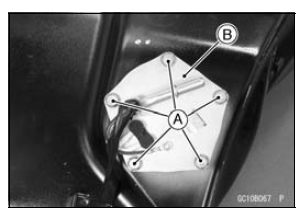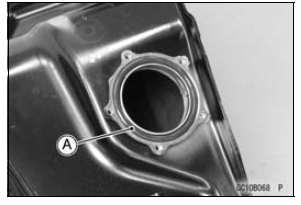

| WARNING Gasoline is extremely flammable and can be explosive under certain conditions, creating the potential for serious burns. Make sure the area is well-ventilated and free from any source of flame or sparks; this includes any appliance with a pilot light. Do not smoke. Turn the ignition switch OFF. Disconnect the battery (–) terminal. To avoid fuel spills, draw it from the tank when the engine is cold. Be prepared for fuel spillage; any spilled fuel must be completely wiped up immediately. |
NOTICE
Never drop the fuel pump especially on a hard surface.
Such a shock to the pump can damage it.
Be careful of fuel spillage from the fuel tank since fuel still remains in the fuel tank and fuel pump. Plug the fuel pipe of the fuel tank.

NOTICE
Do not pull the leads of the fuel pump. If they are pulled, the lead terminals may be damaged.

 Fuel Pump
Fuel Pump Fuel Pump Installation
Fuel Pump InstallationCheck 3-7 Stop Watch Inspection
Connect the leads in the same circuit as Check 3-2.
By pushing the upper button each time to set the stop
watch mode.
Connect the insulated auxiliary lead processed insulation
to the terminal [13] as shown in the figure, then stop watch
start to count.
While count the stop watch, conn ...
Lower Fairing Installation
Installation is the reverse of removal. Note the following.
When installing the pad [A], align the edge of the pad and
the marking of the fairing [B].
When installing the pad [C], align the edge of the pad and
the fairing [D], and fit the edge of the pad to the boss [E].
Insert the hoo ...
Air Switching Valve Removal
NOTICE
Never drop the air switching valve especially on a
hard surface. Such a shock to the air switching
valve can damaged it.
Remove the air cleaner housing (see Air Cleaner Housing
Removal in the Fuel System (DFI) chapter).
Disconnect the connector [A].
Disconnect the hoses [B] from ...